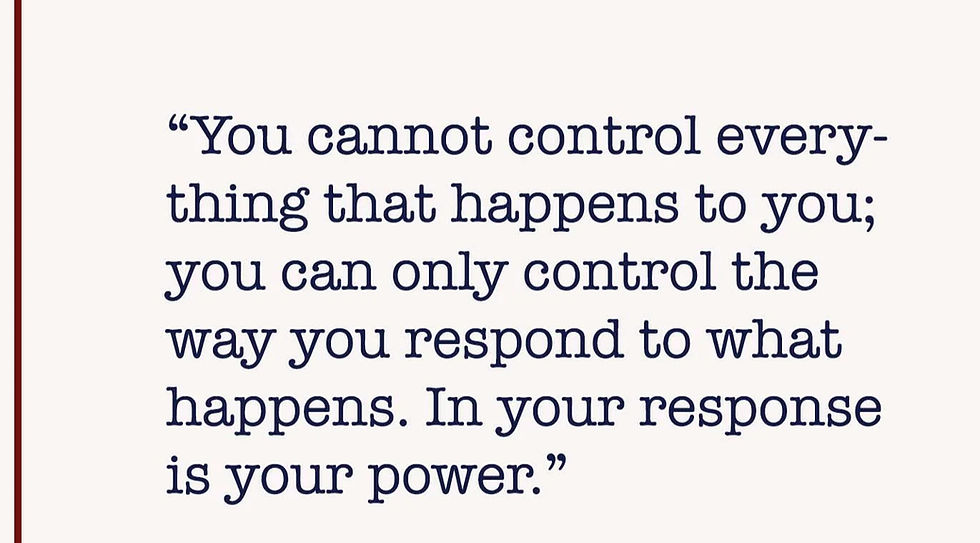EMDR Therapy- healing the brain
- Kirandeep Kaur

- May 8, 2023
- 4 min read
What exactly is trauma?
The American Psychological Association defines trauma as "an emotional response to a terrible event like an accident, rape, or natural disaster." While this is certainly true, The Center for Mind-Body Medicine founder, psychiatrist, and Transforming Trauma: The Path To Hope and Healing author James S. Gordon, MD, says trauma can also be inherited. "The [medical] field of epigenetics has shown that if someone's parents or grandparents suffered significant trauma, it can cause chromosomal changes that can affect the way our genes are expressed," he explains. "These changes can be inherited and what it means is that someone's response to stress isn't as prompt; they aren't as resilient.
"Trauma can affect your entire system, and that of course includes the brain. whenever we're confronted with something that's either physically or mentally distressing, it jump-starts the fight, flight, or freeze response. "In this state, heart rate goes up, stress hormones go up, and our digestive system doesn't work as well,". "The amygdala, the emotional center of our brain and the center of fear and anger, is firing off madly and the frontal part of the cerebral cortex [which plays vital roles in memory, attention, motivation, and numerous other daily tasks] is suppressed."
But this doesn't just happen during the traumatic event itself. Whenever there's a situation or image that resembles the trauma, it can re-activate that fight, flight, or freeze response. This is exactly why someone who has been involved in a shooting may instinctively drop to the ground when they hear a loud noise.
Psychologist and researcher Deborah Korn, PsyD has extensively studied how trauma affects the brain, and one way of healing she's a proponent of is eye movement desensitization and reprocessing (EMDR). She recently co-wrote a book about EMDR as trauma healing, Every Memory Deserves Respect . "Trauma is truly an injury to the brain, and its overwhelming nature is what activates the fight, flight, or freeze response. What can also happen is that it can cause someone to shut down completely, which can lead to feeling depressed and not motivated to participate in life," she says. "What EMDR is focused on is getting the brain to work functionally again. Because it can't function properly when it's stuck in fight, flight, freeze, or shutdown mode."
EMDR was developed in 1987 by a psychologist named Francine Shapiro, PhD. Dr. Shapiro was walking in the park reflecting on some traumatic events that happened to her in the past, and she realized that, as these memories came flooding back, her eyes started moving rapidly back and forth, looking between two trees. She also noticed that, as her eyes moved back and forth, the negative emotions associated with the disturbing memories subsided. Intrigued, she started conducting research studies to see if there was a connection. EMDR is still controversial, but numerous studies in the four decades since its introduction have shown it can play an important role in healing.
EMDR therapy
Here's how it works: During a session, a client is asked to focus internally on a traumatic memory or trigger. At the same time, they're asked to focus their eyes on something—typically the therapist's fingers or a light—moving their eyes bilaterally back and forth. "This creates a condition of 'dual attention'—a simultaneous focus on an external activity and an internal memory or experience—that seems to jump-start and support processing of the memory," Dr. Korn writes in her book. "When clients reprocess traumatic memories and triggers, they are able to reduce distress nd come to terms with significant guilt, shame, unmet needs, grief, and anger while addressing their sense of effectiveness, vulnerability, and powerlessness." If someone has diagnosable trauma—such as post-traumatic stress disorder (PTSD)—it takes three to four sessions to start seeing results, Dr. Korn.

Dr. Korn emphasizes that talk therapy plays a big part in EMDR—someone should never just be thrown back into their traumatic memories. "A therapeutic relationship between the therapist and client needs to be established first, and then you work collaboratively on a treatment plan," she says. EMDR is just one part of that, and there are conversations beforehand about what the client needs to feel safe.
Maria Olsen, who experienced trauma in the form of sexual assault during childhood, says she has had both positive and negative experiences with EMDR. "I was in a black hole of depression that I was desperate to get out of," she says. "Holding on to my trauma was like trying to hold a beach ball underwater; it took a tremendous amount of energy." She says even 20 years after the assault occurred, she was still triggered by memories, so she sought out EMDR as part of her treatment.
Olsen says she did EMDR, she says it was healing for her. "It was with someone with more training—a therapist specifically for people who had been sexually traumatized—and it was a good experience," she says. "We spent much more time talking." She believes the EMDR was helpful in making the memories of her sexual assault less anxiety-inducing when they surface, but she also says speaking out about her experience—with therapists and in general—also tremendously helps.



Comments